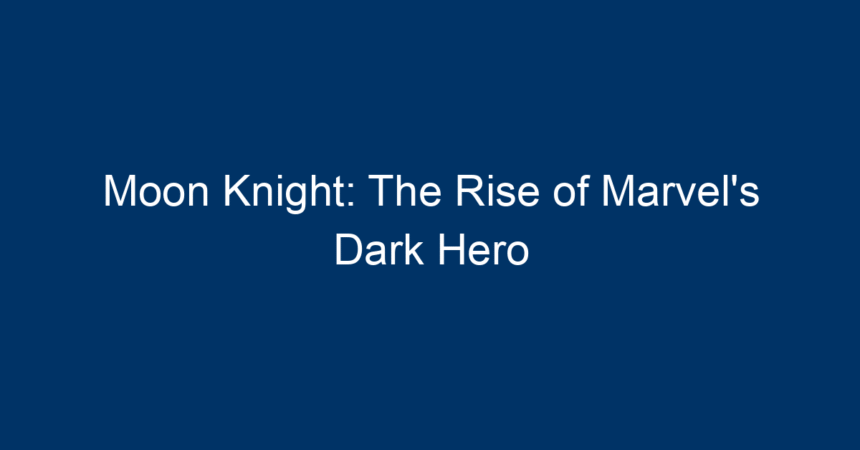In the vast universe of Marvel Comics, few characters have captivated audiences quite like Moon Knight. With a compelling mix of mysticism, psychological complexity, and superhero flair, Moon Knight has emerged from the shadows to carve a niche as one of Marvel’s most intriguing dark heroes. This article delves into the enigmatic rise of Moon Knight, exploring his origins, psychological struggles, and impact on the Marvel Cinematic Universe (MCU), while uncovering what makes this character resonate with fans worldwide.
The Origins of Moon Knight
A Complex Creation
Moon Knight debuted in Werewolf by Night #32 in 1975, created by writer Doug Moench and artist Don Perlin. Initially conceived as a villain, Moon Knight quickly transitioned into a hero, embodying a unique blend of vigilante justice and psychological depth. His alter ego, Marc Spector, is a former Marine turned mercenary with a troubled past, which adds layers to his character.
Birth of a Dark Avenger
Marc Spector’s transformation into Moon Knight starts when he is betrayed during a mission in Egypt. Left for dead, he is resurrected by the Egyptian moon god Khonshu, who instills in him a mission to fight crime as his earthly avatar. This supernatural twist not only solidifies Moon Knight’s connection to the moon but also introduces themes of resurrection, revenge, and justice.
Multiple Identities
One of the most captivating elements of Moon Knight is his struggle with dissociative identity disorder (DID). Spector’s identity crisis manifests in multiple personas: the millionaire Steven Grant, the cab driver Jake Lockley, and, of course, Moon Knight himself. Each identity serves a purpose, reflecting Spector’s fractured psyche and deepening the narrative complexity.
Moon Knight in Comics
Evolution Through the Decades
Over the years, Moon Knight has undergone significant transformations. Writers like Doug Moench, Warren Ellis, and Jeff Lemire have contributed to his lore, each bringing unique storytelling styles that expanded his character. Notable comic runs include:
- The Moench-Perlin Run (1975-1978): Established Moon Knight’s core characteristics and motivations.
- Moon Knight: The Bottom (2006): A deep exploration of Spector’s mental health, showcasing the darker aspects of his persona.
- Moon Knight Vol. 7 (2014): A reimagining that connected him more closely to street-level heroes, showcasing his blend of crime-fighting and supernatural elements.
Themes and Symbolism
Moon Knight’s narratives often touch on themes such as justice, morality, and the thin line between sanity and madness. His connection to Khonshu makes him a conduit for exploring the moral implications of vengeance and redemption. As a result, readers find themselves drawn to his struggle not just against villains but against himself.
The Rise of Moon Knight in the MCU
Introduction to the Cinematic Universe
With the increasing popularity of Marvel’s dark heroes, Moon Knight’s transition to the MCU has been highly anticipated. The character made his MCU debut in the Disney+ series Moon Knight, which premiered in March 2022, introducing a new audience to the complexities of Marc Spector.
What Sets the Series Apart
The Moon Knight series is distinct in its exploration of mental health and the supernatural. Oscar Isaac, who plays Marc Spector, delivers a powerful performance that captures the character’s turmoil and multifaceted nature. The show incorporates Egyptian mythology, adding a rich cultural backdrop that further enhances Moon Knight’s narrative.
Critical Reception and Cultural Impact
Upon its release, Moon Knight received critical acclaim for its innovative storytelling and character development. It has sparked conversations about mental health representation in media, resonating with viewers who appreciate authentic portrayals of complex psychological issues. The inclusion of Spector’s various identities allows for a unique exploration of identity and the human condition, making Moon Knight more relatable than ever.
The Impact of Moon Knight on Pop Culture
Merchandise and Fan Engagement
The rise of Moon Knight has led to an influx of merchandise, from action figures to apparel, allowing fans to embrace the character in their daily lives. Comic shops report a surge in interest, with increased sales of Moon Knight comics and trade paperbacks. Social media platforms have become hotbeds of fan theories and discussions, further solidifying Moon Knight’s status as a pop culture phenomenon.
The Future of Moon Knight
With the success of the Disney+ series, speculation about future appearances in the MCU is rampant. Potential crossovers with characters like Blade or The Punisher could explore the darker corners of the Marvel Universe. Additionally, the rich lore surrounding Moon Knight could lead to new storylines in comic form, perhaps focusing on other aspects of Egyptian mythology or diving deeper into his psychological struggles.
Conclusion: The Enduring Legacy of Moon Knight
Moon Knight has undoubtedly risen to become one of Marvel’s most compelling dark heroes. His intricate history, complex character development, and rich thematic explorations have connected strongly with fans. As we look toward the future of Moon Knight in comics and the MCU, it’s clear that this dark hero will continue to resonate with audiences, exploring the nuances of identity, justice, and the battle between light and darkness within us all.
Actionable Insights
- Explore the Comics: If you’re new to Moon Knight, start with his key comic runs. Each edition offers different insights into his character and narrative depth.
- Engage with the Series: Watch Moon Knight on Disney+ to fully appreciate Oscar Isaac’s portrayal and the intricate storyline that reflects real-world psychological struggles.
- Join the Community: Engage with fan communities online. Discuss theories, share perspectives, and delve deeper into the lore surrounding Moon Knight and his universe.
In a world where heroes are often painted in shades of gray, Moon Knight stands out as a multifaceted character, reminding us that even in darkness, there can be light—if only we are willing to look for it.




